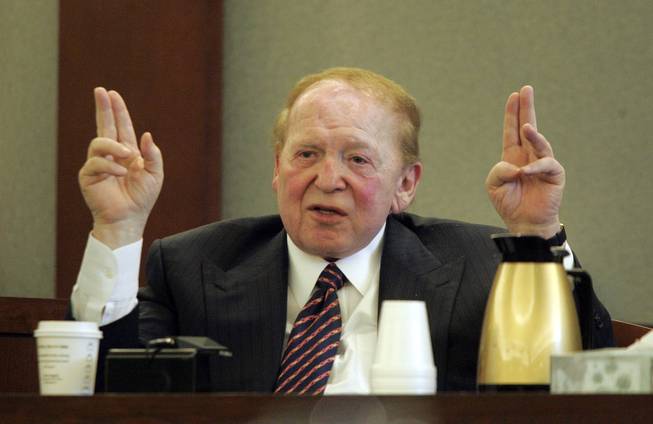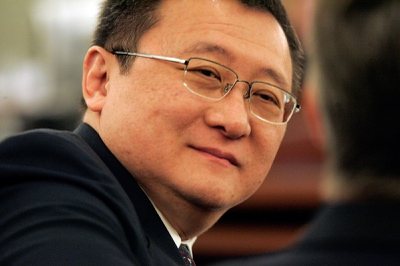
Las Vegas Sands Corp. Chairman Sheldon Adelson gives testimony during the a trial resulting from a lawsuit by Hong Kong businessman Richard Suen.
Tuesday, Aug. 31, 2010 | 3:17 p.m.
Sun Archives
- Las Vegas Sands settlement cancels trial over Macau interests (6-4-09)
- Sands leader’s exit comes amid tests (3-11-09)
- Sands attorney’s arsenal includes name-calling (4-30-08)
- A mogul’s softer side (4-19-08)
Sun Coverage
CARSON CITY – Gaming mogul Sheldon Adelson says a Las Vegas jury relied on “wishful thinking” in awarding $43.8 million to a Hong Kong businessman who says he used his influence to help Adelson get approval for two casinos in Macau.
Adelson says there was no evidence presented at a 29-day trial to award the money to Richard Suen, who claims he was offered $100 million at one point.
Adelson, through his lawyers, will present his appeal to the Nevada Supreme Court on Thursday in behalf of himself, Las Vegas Sands Inc. and its former president, William Weidner.
Suen argues he gave the casino idea to Adelson and officials with Las Vegas Sands Inc. to invest in Macau. He says he facilitated meetings with Chinese officials and rescued Adelson's bid when his proposal was in trouble.
The $43.8 million increases to $58.6 million when prejudgment interest is added.
Las Vegas Sands Inc. owns the Sands Expo and Convention Center and the Venetian and Palazzo hotel-casinos in Las Vegas. Adelson is chairman and chief executive officer of the company.
Las Vegas Sands opened the Sands Macao in 2003 and the Venetian Macao in 2007.
When they couldn't reach a financial agreement, Suen filed suit in Clark County District Court in Las Vegas against Adelson, the company and Weidner alleging he used his influence to get the Macau licenses.
Macau had decided in 2000 to end a monopoly and open the gambling market to competition. Adelson met Suen on a trip to Macau in July 2000, and Suen says he arranged for several meetings with Chinese officials for Adelson and Sands officials. At the time, business in Las Vegas was down due to the Sept. 11 terrorist attacks.
Adelson sought partners to build the casino, with the Las Vegas company operating the gambling. An agreement was reached with a company called Galaxy for a $1.1 billion investment. But Galaxy, which was affiliated with a Hong Kong investor, bowed out, objecting to the disclosure requirements that applied under Nevada law.
By that time, cash flow had improved and Las Vegas Sands Inc. had received permits to construct casinos on its own. During this period, Suen says he conducted a number of meetings that resulted in Las Vegas Sands getting approval for the casino construction.
Las Vegas Sands says Suen never introduced it to any potential partners. The company argues there was no evidence that influence by Suen prompted Chinese officials to express any preference for Las Vegas Sands.
Samuel Lionel, the attorney for Las Vegas Sands, said this judgment "breaks new ground in permitting a United States jury to award tens of millions of dollars based on allegedly irregular actions of a foreign government." He said the jury was allowed to presume illegal influence without the slightest evidence that it occurred.
Suen attorney James Pisanelli said there was no evidence of a violation of the law. He said there was "unrebutted testimony” that influence by the Chinese government over Macau doesn't violate the basic law.
Macau is a “special administrative region” of China. Law forbids China from interfering in the Macau government except on issues of foreign affairs and national defense.
The court is expected to take the arguments under study and rule later.


Join the Discussion:
Check this out for a full explanation of our conversion to the LiveFyre commenting system and instructions on how to sign up for an account.
Full comments policy